Alibaba’s Major Move in Divesting Physical Retail Assets
Alibaba Group Holding Ltd. has announced the sale of its majority stake in Sun Art Retail Group Ltd. to private equity firm DCP Capital. This move signals Alibaba’s strategic shift away from physical retail to concentrate on its core online operations. The transaction is expected to generate gross proceeds of up to HK$12.3 billion ($1.6 billion), significantly lower than the $3.6 billion Alibaba invested in 2020 to increase its stake in Sun Art.
The sale comes at a steep discount, as Sun Art’s 2024 market value is estimated at approximately $3 billion. Following the announcement, Sun Art’s shares dropped by as much as 35% during early trading in Hong Kong, while Alibaba’s shares saw a modest decline of over 1%.
Sun Art, known for its Costco-like hypermarket stores under brands such as RT-Mart, also operates a robust distribution network that complements Alibaba’s fresh produce initiatives. However, intensifying competition from emerging players like PDD Holdings Inc. and ByteDance Ltd. has pushed Alibaba to streamline its operations.
Financial Implications and Strategic Focus
The sale aligns with Alibaba’s broader efforts to divest non-essential holdings and focus on promising growth areas, such as artificial intelligence and cloud computing. Analysts estimate Alibaba will incur losses of around $3 billion from its disposal of physical retail assets, including Sun Art. The sale price, at a 0.6x price-to-net asset valuation, lags behind market value estimates and significantly trails the 3.5x multiple achieved by JD.com in a similar transaction involving Yonghui Superstores.
Proceeds from the sale are tied to Sun Art’s profits through 2028, introducing additional financial uncertainty as rivals like Meituan deepen partnerships with international players such as Walmart.
This latest development follows a pattern of divestments under new CEO Eddie Wu, who has prioritized investments in Alibaba’s online marketplaces, cloud computing, and international ventures. In November, Alibaba sold its Intime department store business to Youngor Fashion Co. for $1 billion, marking a loss of 9.3 billion yuan ($1.3 billion) from the initial investment.
Alibaba’s Path Forward: A Return to Core Competencies
Alibaba’s retreat from physical retail underscores its return to core online commerce, a strategy reinforced by the integration of its domestic and international e-commerce divisions under executive Jiang Fan. This realignment comes as Alibaba faces growing competition from digital commerce platforms, prompting it to double down on its strengths.
The company is also expanding its international footprint, including a recent joint venture aimed at accelerating growth in South Korea. Alibaba views these moves as vital to enhancing shareholder returns and sustaining long-term growth.
While shedding its Sun Art stake marks a strategic pivot, Alibaba maintains minority investments in other traditional retail businesses, such as the electronics chain Suning.com Co. These holdings, part of former CEO Daniel Zhang’s expansion into brick-and-mortar retail, may also face scrutiny as Alibaba sharpens its focus on digital initiatives.
Alibaba’s statement highlights the decision as an opportunity to monetize non-core assets and refocus resources. “The sale will enable us to better develop our core businesses and enhance shareholder returns,” the company said.
This transaction exemplifies Alibaba’s commitment to realigning its priorities amidst an increasingly competitive retail landscape.









